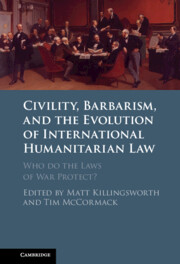 Civility, Barbarism and the Evolution of International Humanitarian Law
Civility, Barbarism and the Evolution of International Humanitarian Law Book contents
- Civility, Barbarism, and the Evolution of International Humanitarian Law
- Civility, Barbarism, and the Evolution of International Humanitarian Law
- Copyright page
- Contents
- Contributors
- Preface and Acknowledgements
- Abbreviations
- 1 Introduction
- 2 Sieges and the Laws of War in Europe’s Long Eighteenth Century
- 3 All’s Fair in Love and War or the Limits of the Limitations
- 4 Cultivating Humanitarianism
- 5 Limits to the Scope of Humanity as a Constraint on the Conduct of War
- 6 The State, Civility, and International Humanitarian Law
- 7 Operationalising Distinction in South Sudan
- 8 Private Military and Security Companies and International Humanitarian Law
- 9 Protecting Warfighters from Superfluous Injury and Unnecessary Suffering
- 10 Blurring the Lines
- 11 A Step Back to Take a Step Forward
- Index
- References
10 - Blurring the Lines
How Are Female Child Soldiers Protected by the Laws of War?
Published online by Cambridge University Press: 11 January 2024
- Civility, Barbarism, and the Evolution of International Humanitarian Law
- Civility, Barbarism, and the Evolution of International Humanitarian Law
- Copyright page
- Contents
- Contributors
- Preface and Acknowledgements
- Abbreviations
- 1 Introduction
- 2 Sieges and the Laws of War in Europe’s Long Eighteenth Century
- 3 All’s Fair in Love and War or the Limits of the Limitations
- 4 Cultivating Humanitarianism
- 5 Limits to the Scope of Humanity as a Constraint on the Conduct of War
- 6 The State, Civility, and International Humanitarian Law
- 7 Operationalising Distinction in South Sudan
- 8 Private Military and Security Companies and International Humanitarian Law
- 9 Protecting Warfighters from Superfluous Injury and Unnecessary Suffering
- 10 Blurring the Lines
- 11 A Step Back to Take a Step Forward
- Index
- References
Summary
This chapter explores the protections afforded under the laws of war to young women and girls who, over the course of a single conflict, may occupy the roles of a child, a civilian, a combatant, a killer, a victim of sexual violence, and/or a mother. But rather than exploring this question into relation to women and girls as a homogenous group, it focuses on one young woman in one conflict, the so-called Second Congo War. Drawing on testimony provided by this witness during the Ntaganda case at the International Criminal Court (ICC), the chapter presents a critical view on the role of law in war. It observes that even with advances in legal protections for women and girls, as demonstrated by this important ICC case, in practical terms these actors often have no one to protect them but themselves.
- Type
- Chapter
- Information
- Civility, Barbarism and the Evolution of International Humanitarian LawWho do the Laws of War Protect?, pp. 200 - 217Publisher: Cambridge University PressPrint publication year: 2024


